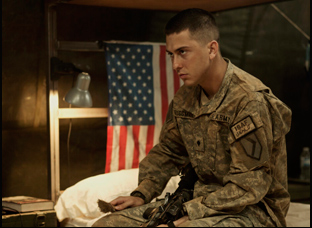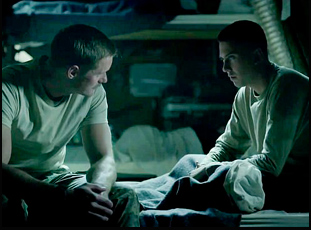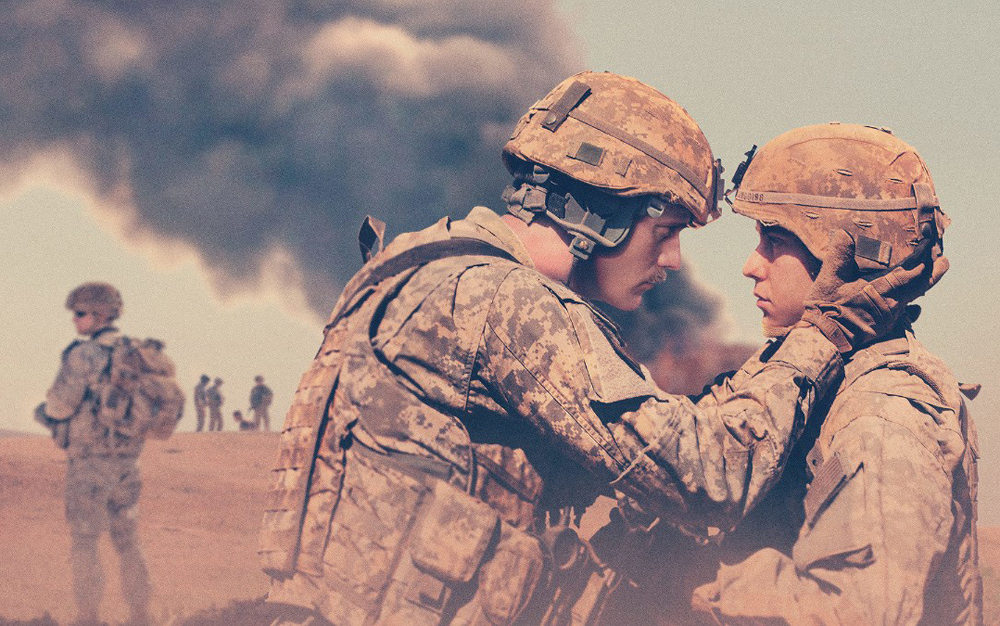It isn’t entirely uncommon for filmmakers who have primarily made documentaries to make their narrative debut based on their past work, either because of their obviously great familiarity with the story or proving themselves to producers with the material already. However, Dan Krauss does something truly fascinating with “The Kill Team,” which shares a title, but little else in common, with his 2013 nonfiction account of the case of Adam Winfield, an Army Specialist who reported that his fellow soldiers had committed a premeditated murder of a civilian while on patrol in Afghanistan at the behest of their commander. While the documentary focused on the military tribunal that was convened to bring Staff Sergeant Calvin Gibbs and others in his platoon to justice after Winfield came forward, and the pressure that put on the whistleblower to testify against the men he fought alongside in war, Krauss takes a different tact to get inside the head of a recent recruit named Andrew Briggman (Nat Wolff), focusing not on a fallout from the report, but the temptation of not reporting as insidious groupthink takes over his troop and he threatens to lose any individual moral perspective he has.
You can see rather quickly why Briggman would be susceptible to go with the flow in Kandahar where the war has settled into a stalemate by 2009, not because of any personal failings, but the sheer magnetism of his commander Sergeant Deeks (Alexander Skarsgård). Telling his men that in return for their loyalty, he’ll offer the opportunity for them to become war heroes, Deeks feels he can only hold up his end of the bargain if he livens up the tour of duty by creating his own opportunities for the soldiers to engage in combat, often at the expense of innocent civilians. Krauss, who cleverly evaded the typical exchange that neuters such films by having to ask the U.S. military for equipment to use for the sake of accuracy — the film relied on digital wizardry for such an effect — gives himself the wherewithal to ask a number of provocative questions about modern warfare that show a bravery akin to Briggman’s, observing how the soldier is subtly radicalized once he becomes part of the patrol in Afghanistan by wanting to please those around him and how the need for perpetual combat has largely drained humanity out of those who serve, changing the mission from a goal of protection to aggression.
Boasting a pair of compelling performances from Wolff and Skarsgård at its center, “The Kill Team” is strong stuff and with the film on its way to theaters and being made available on demand after a premiere at the Tribeca Film Festival, Krauss spoke about how he was able to get the most out of his cast, revisiting the real-life inspirations for the drama and the unexpected genre he turned to for guidance to tell this story.

Mostly, it was the challenge of taking what I had learned in making the documentary and finding a way to create a cinematic experience that was present tense and first person, forcing the audience to confront the impossible choices that some of these guys faced in real life. Documentary is, frequently, very objective filmmaking and this was an opportunity to try to take a story I had told from an objective viewpoint and try to create a subjective experience, in a way that was more visceral and predicated more on emotion.
In recreating this situation, there anything you came to understand better about the soldiers going through this?
Yeah, I came to have an appreciation for the way in which young men and women with good intentions can be funneled into making decisions that they may not ordinarily make in their regular lives, and in writing the characters, I was very careful not to pass judgment. It was important that they be as complex and contradictory in the way that actual people can be. When I was talking to soldiers for the documentary, I think there is an expectation or presumption, among some people in this country, that soldiers are not particularly thoughtful — they’re physical — and that was not at all my experience. I met a group of guys who were remarkably thoughtful and intelligent and ambitious. I think they all had good intentions when they joined and the journey of how they got from that place to where they ended up — for several of them, it was in prison — tells me a lot about human nature, human morality, how institutions create conformity and how easy it can be in some circumstances to manipulate and distort the point of view of young men and women who are trying to find their footing in the world. So writing the characters and living inside them added to the experience of speaking to them because I had to put myself in the position of seeing the world from their point of view.
I understand there was about two weeks of training with everybody but Alexander Skarsgard – was there anything there you saw you could bring into the movie?
What was fascinating and so delightful was how quickly the guys bonded. I had an old film mentor that always used to tell me casting is everything and I found that never to be more true than in this film. Within a couple of days, it felt like the guys had known each other for 10 years and there was this instant bond that really carried over into the film in a way that felt very authentic and was necessary to help the audience understand the cohesiveness of that group and just how difficult and frightening it can be to stand up and raise an objection, to hold up your hand and say, “I object to the direction this group is moving.” You can feel that in the feature in a way that’s deeply unsettling because you come to love and perhaps even admire this group for the depth of their fraternity and their love for each other.
And it’s interesting – as I was writing the movie, it dawned on me that this was very much like a mafia movie. Deeks was the don and he was carefully testing each of the guys in his group to see who would be loyal and who he could not trust to be loyal, so I watched mob movies and read mob movie scripts. In “Goodfellas,” somebody says [something along the lines of] “It’s not the guy that acts threatening or menacing that will kill you, it’s the friend standing next to you with a smile on his face.” That notion of not knowing whether the guy next to you is going to kiss you or kill you was something that I had some fun, which probably isn’t the right word, in creating that subtext.

First of all, he’s a tremendously talented actor, but what’s unique about Nat, at least this stage in his career is really, he’s believable as a grownup – a man – but with some vestiges of his youth still intact and on display. And just like Nat, Andrew Briggman is someone young and idealistic and ambitious and he thinks he can change the world. Nat is in that same place in his life where he’s a very successful young actor who has a huge opportunity in front of him to be one of the actors of our generation, and I think he could harness that ambition for the character. But the character is much more contained than Nat is naturally and there were many challenges, but chief among them I’d expect is that he had to contain a lot of the angst his character was feeling. But you can see it in the eyes, and that’s what I love so much about Nat’s performance. He doesn’t have a lot of lines of dialogue, but his eyes are speaking volumes.
He’s fantastic in it. Since this is a dramatization, but based in reality, how much did you want to give your actors versus letting them discover things for themselves?
Of course the documentary was a great starting point for all the actors, and in the case of Nat, Nat met with Adam Winfield, the soldier in the documentary who’s the basis of the Andrew Briggman character. But we were all very clear that Andrew Briggman was a fictional character, and I don’t want to presuppose what part of that experience was important to Nat, but I imagine just having the opportunity to talk to Adam firsthand about the kinds of choices that he was faced with was really informative in the way he prepared for the character and I know he’s very grateful he was able to spend that time with Adam.
Alex [Skarsgard] came in and there was no opportunity to talk to any of the other soldiers and we deliberately, as you mentioned earlier, withheld Alex from the group for as long as we could for their response to feel as authentic as possible. He’s a physically imposing guy, but also psychologically imposing as Deeks and I think that gambit really paid off. There’s a real awe and respect for Deeks when he appears on the scene and that tells us everything we need to know about why they’re willing to follow him as deeply into this moral abyss as they go. Alex approached the role with such kindness and softness and there’s a way in which his character is really playing a seducer, luring these young, impressionable soldiers deeper, deeper into his net, and he understood that in reading the script. He was really excited about playing the character who was both intimidating and commanding of respect, but also someone had that sense of warmth and empathy. Deeks believes what he is doing is protecting his guys and he can be a doting father in one scene and he can be remorseless about the death of a young man in the next scenes, and to get those scenes to live comfortably next to each other was one of the challenges that we really embraced in making the movie.
“The Kill Team” opens on October 25th in Los Angeles at the Laemmle Music Hall and New York at the Village East Cinemas. It’s also available on iTunes.




